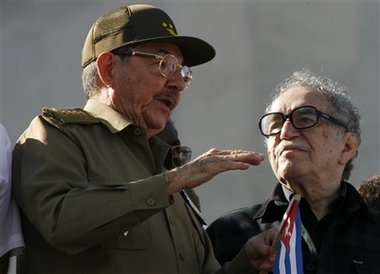Castro's no-show raises doubts on return
(AP)Updated: 2006-12-03 09:44
HAVANA - Fidel Castro was a no-show Saturday at a major military parade that doubled as his 80th birthday celebration, raising questions about whether the ailing leader will ever return to power as his public absence begins taking on a tone of permanence.
 Cuba's acting president Raul Castro, brother of Cuban leader Fidel Castro, left, chats with Colombian writer Gabriel Garcia Marquez during a military parade along the Revolution Square in Havana, Cuba, Saturday, Dec. 2, 2006. The ailing Fidel Castro did not show up to a huge military parade Saturday marking the 50th anniversary of the founding of Cuba's Revolutionary Armed Forces, fueling speculation about the severity of his condition and the possibility he may not return to power. [AP] |
Many Cubans had hoped for at least a glimpse of Castro before dozens of olive-camouflaged tanks rumbled through the Plaza of the Revolution and jet fighters soared above the capital to mark the 50th anniversary of the formation of Cuba's Revolutionary Armed Forces.
Castro hasn't been seen in public since July 26, before he underwent secretive intestinal surgery and temporarily ceded power to his younger brother, Raul. He delayed his 80th birthday celebration from Aug. 13 to this week in order to give himself time to recover, and speculation had been rife whether he would appear.
The military event, which lasted about two hours, culminated five days of events to celebrate Castro's birthday - none of which he attended.
Instead, it was Raul Castro, the island's defense minister, who stood at the mahogany lectern reviewing the troops during Saturday's parade.
The parade's most obvious purpose was to warn the U.S. against taking advantage of Fidel Castro's illness to attack the island. In the last 15 years the Cuban military has taken on a purely defensive role, and is trained to repel invaders.
In a speech that lacked his brother's rhetorical flourishes, Raul Castro reached out to the U.S. government, which has a decades-old trade and travel embargo against the communist-run island. He did not explain the absence of his brother.
"We take this opportunity to once again state that we are willing to resolve at the negotiating table the long-standing dispute between the United States and Cuba," as long as the U.S. respects Cuba's sovereignty, said Raul Castro, who turned 75 in June.
"After almost half a century, we are willing to wait patiently until the moment when common sense prevails in Washington power circles," he added.
U.S. State Department spokeswoman Janelle Hironimus said Saturday that "the dialogue that needs to take place is one between the Cuba and the Cuban people about the democratic future of the island.
"Any deepening of our engagement with Cuba depends on that dialogue and the Cuban regime's willingness to take concrete steps toward a political opening and a transition to democracy," she added.
Raul Castro used the event to underscore cohesion among the Cuban people, the armed forces and the Party - a recurring theme among officials in recent days.
"This unity is our main strategic weapon, which has made it possible for this small island to resist and overcome so many aggressions from imperialism and its allies," he said.
Cuban officials insist Fidel Castro is recovering, but U.S. officials say they believe he suffers from some kind of inoperable cancer and will not live through the end of 2007. He has appeared thin and pale in photographs and videos released by the government in recent months.
Some U.S. doctors have speculated he could have diverticulosis, a condition relatively common among older people that is caused when weak spots form along the colon and intersect with an artery.
Fidel Castro purportedly sent a message to those celebrating his birthday earlier this week, telling a crowd of 5,000 supporters at the opening event Tuesday at a Havana theater that he was too sick to meet with them.
"I direct myself to you, intellectuals and prestigious personalities of the world, with a dilemma," said a note read at the event. "I could not meet with you in a small locale, only in the Karl Marx Theater where all the visitors would fit, and I was not yet in condition, according to the doctors, to face such a colossal encounter."
Magda Avila, a 70-year-old army veteran, said she was not disappointed the elder Castro did not appear at the parade. "It is fine that he didn't come, so that he can recuperate," she said.
In Miami, Alfredo Mesa, executive director of the anti-Castro Cuban-American National Foundation, said the leader's failure to appear was unimportant.
"For us, Fidel Castro is part of the past," Mesa said. "The pressure is on those who did appear, for them to let Cubans in Cuba decide for themselves what kind of future they want."
Venezuelan President Hugo Chavez said in Caracas that Castro was still "alive and kicking" and that Cuba's communist revolution will live on. Chavez could not attend the parade because he faces re-election Sunday.
|
||
|
||
|
|